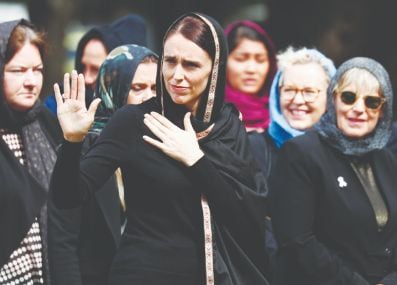Last week, New Zealand’s women, including prime minister Jacinda Ardern, wore headscarves to show solidarity with the Muslim community in the wake of terrorist attacks that targeted mosques. The act drew mixed reactions: while some praised New Zealand for the show of support, others questioned whether donning the hijab, a symbol of oppression in several Muslim majority countries, was necessary to express togetherness. [caption id=“attachment_6351901” align=“alignleft” width=“397”]  New Zeland Premier Jacinda Adern and others wearing hijabs.[/caption] It is seminal here to consider the repercussions of Scarves in Solidarity—not only because the hijab has oppressive origins, but it is still used in several Muslim majority countries to control women’s bodies. Furthermore, the idea that hijab signifies the Muslim community stereotypes Muslim women in particular and the community in general. Yet, the biggest flaw of the Scarves in Solidarity movement is regarding women as active identity bearers of a community. The idea that women must bear the burden of a community’s identity, which is at the core of so much religious practice and belief, is one of the core dictates of patriarchy. The hijab—literally, curtain—descended on Islam after the battle of Uhud in Arabia. The Prophet Muhammad drew the hijab as a partition to seclude his private life from his public life. Fatima Mernissi, a sociologist and feminist, describes how any man wishing to communicate with Muhammad’s wives was to do so on the other side of the curtain. Furthermore, the defeat of the Muslim community in battle of Uhud created a crisis in Medina. Mernissi argues how women in the streets were being harassed by men and propositioned to commit ta’arrud (literally, obstructing a woman’s path and urging her to fornicate). Muhammad then mandated his wives to cover up with a jilbab, a piece of cloth used to cover the head and the chest of a woman, in order to separate themselves from the other women. Hijab, thus, punished the women for the harassment meted out to them on the streets. It also sharpened class difference. The aristocratic women could wear jilbab (and not be harassed) but slave women were not to wear it (and could be harassed). If hijab came in response to sexual aggression it also came as a support to it. It legitimized the street as a place to commit zina with the “uncovered women”. Hence, a woman’s body came to be considered in Islam as essentially naked/vulnerable without a jilbab. The difference became sharper with time. Legal scholars such as Ibn Abdun would in medieval times advise men to keep their women, a family’s honour, out of sight of unrelated males. The oppressive origins of hijab, have made it an active a tool to subjugate Muslim women. In countries such as Iran and Saudi Arabia forced veiling is practiced that has led to scores of protests by women in these countries. The lawyer Nasrin Sotoudeh has only recently been sentenced to 38 years in prison, and 148 lashes, for representing women who defied Iran’s hijab laws. As if the upholding of an oppressive symbol was not damaging enough, New Zealand’s Scarves in Solidarity movement also stereotypes Muslim women, many of whom do not wear the headscarf. It presupposes, in the most orientalist manner, that hijab-clad women are the norm in the Muslim community. Considering the hijab as a synonym for the Muslims not only disadvantages women actively fighting against its enforcement but also has a deleterious effect on womanhood in general. It marginalizes women as merely a property of the community. Proponents of New Zealand’s Scarves in Solidarity regards hijab as a neutral symbol of Muslim identity. Yet, if symbols of oppression could be purged of their exploitative histories in a day, feminism would have already triumphed. Associated with the hijab is centuries of suppression and body policing. Using it to show solidarity is to marginalize the women actively fighting against its enforcement and yearning to break free. (Ruchika Sharma is a doctoral scholar in history at the Jawaharlal Nehru University)
The biggest flaw of New Zealand’s Scarves in Solidarity movement is regarding women as active identity bearers of a community
Advertisement
End of Article


)

)
)
)
)
)
)
)
)



